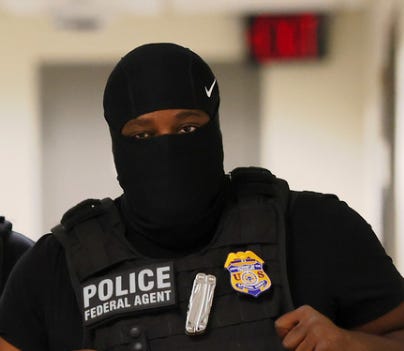Some liberties end in ICE
A few items that caught my notice about our new secret police
ICE, our new secret police agency, claims its agents must wear masks and conceal their identities because of a rising risk of violence on the job or home terror attacks. But according to this must-read piece by Philip Bump at the Washington Post: it refuses to substantiate those claims -- and there's much reason to doubt them.
ICE does not publish numbers on assaults suffered by its agents, and since the agency has a habit of characterizing noncooperation like that of New York City Comptroller Brad Lander's as "assault," it’s not clear how reliable its numbers would be anyway. Meanwhile, the related but more aboveboard Customs and Border Protection agency does publicly tabulate the number of assaults on its agents. They've been declining since 2022 and are down again in 2025.
ICE's own press releases indicate that most violence occurs during detentions, which hiding identities does nothing to prevent, as Bump notes. "ICE didn’t provide me with any examples of immigration officers being identified, targeted and assaulted outside of the context of an arrest."
Noem, Bondi & Co. are asking us to get used to a brutal and unaccountable secret police force because of scary hypotheticals about home terror attacks. Meanwhile, judges, state lawmakers and others courageously do their jobs in public each day despite very real home terror attacks.
*
Over at The Bulwark, the editorialists make an interesting point about how the Trump Administration's refusal to respect process rights for persons once detained tends to raise the stakes and tension during the act of detention itself:
"There’s [a] way in which ICE’s lawlessness has incentivized Good Samaritans to resist their enforcement efforts. Think of how ICE arrests used to go. Agents show up to take a person into custody. They may be in uniform or in plainclothes, but their faces are visible and they show their badges when asked. The person they’re arresting knows he’ll have the opportunity to speak to a lawyer, to tell his family where he’s being held, and to plead his case before a judge.
"Now snap back to the present day and put yourself in Lander’s shoes. Masked agents show up to whisk a migrant away. Maybe he’ll get to tell his family where he is, maybe he won’t. Maybe he’ll have the opportunity to speak to a lawyer or plead his case to a judge, maybe he won’t. And you think to yourself: *Will there be a legal process? Or am I the very last person who has a chance to intervene on this person’s behalf?*"


